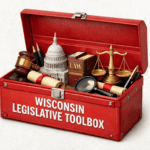Well, we got you to your Friday. Here’s hoping it is smooth sailing into a nice weekend. But first, for most, is your last day of work or classes for the week. And, of course, this is the week’s final installment of our Key Reads. As always, for more information on any of the stories we highlight, just click on the headline.
More “fun” with maps.
The Democrats have power thanks to winning elections that created a new, liberal, majority in the Wisconsin Supreme Court. They intend to aggressively exercise this power, for as long as they have it. The latest example: Governor Evers has, as these congressmen point out, requested the Court review and possibly redraw the state’s Congressional district lines. The current lines may have Constitutional flaws, Evers claims.
Evers drew those very maps, just last year.
But that was before former Justice Dan Kelly lost another election, causing the ideological shift in the Court. So Governor Evers is hoping for an even more electorally-advantageous outcome from the new, activist Court.
Wisconsin GOP congressmen: Evers drew congressional maps he wants struck down – The Center Square
“The maps are a 100% product of the Dems,” Van Orden said in a tweet. “Evers drew them. Zero Republicans voted for them. Wisconsin Supreme Court ruled them constitutional. US Supreme Court ruled them constitutional. This is a naked power Dem grab.”
WOW County Republican Congressman Scott Fitzgerald said the same thing.
“I’d like to remind @GovEvers that he is asking the State Supreme Court to review the Congressional maps HE drew,” Fitzgerald said in a tweet. “The map he is now seeking to overturn was drafted by Evers and based off a 2011 bipartisan map, approved by the liberals on the state Supreme Court and survived a challenge all the way to the U.S. Supreme Court.”
Evers said reviewing the Congressional maps is part of his effort to “do the right thing.”
We would be shocked if the Court didn’t give Evers and Company exactly what they want.
Surplus? What budget surplus?
Wisconsin Assembly approves increases in out-of-state outdoor license fees to help close deficit– WCCO
The Wisconsin Assembly approved a bill Thursday that would raise a variety of hunting, fishing and trapping license fees for out-of-state residents to help shrink a deficit in the state’s fish and wildlife account.
The Assembly passed the legislation 97-0, sending it to the Senate.
The state Department of Natural Resources estimated the changes would generate about $780,000 more annually for the account, which funds a variety of projects ranging from fish stocking to wildlife surveys.
The account is built largely on license fee revenue. But years of waning interest in outdoor activities has led to a projected $16 million deficit in the account heading into the state’s next two-year budget period.
Authorities conducted a major drug sting in Northern Wisconsin.
Drug distribution ring busted after extensive,18-month investigation– WFRV
Roughly a quarter of a million dollars worth of fentanyl, methamphetamine and other drugs were seized after an 18-month investigation busted one of the largest fentanyl distribution networks ever investigated in western Wisconsin.
According to the Eau Claire Police Department, the investigation conducted by the West Central Drug Task Force led to the arrest of six people, two of which have also been indicted by a Federal Grand Jury.
The work on this is never ending, but so important.
It is a very big weekend for cross country skiing enthusiasts. It’s time for the Birkie!
After 50 years, ‘Birkie Fever’ still running hot for northern Wisconsin cross-country ski race– MPR
Long before the American Birkebeiner grew into the largest cross-country ski race in North America, attracting more than 10,000 skiers from around the country and world, it was a far-fetched idea of Tony Wise, an entrepreneur from Hayward, Wis., intent on luring more people to his hometown.
Wise discovered skiing while serving in Europe during World War II, and founded the Telemark downhill ski area outside Cable, Wis., in the 1940s.
In 1973 he launched what has become known simply as the ‘Birkie’ — modeled after the original Birkebeiner long distance ski race in Norway.
Very important: It has now been a month since the Packers played. That’s too long to go without news about the greatest franchise in professional sports. Luckily for all of us, they held a press conference yesterday where they introduced their new defensive coordinator. We have a feeling Packers fan will finally like the person in charge of the defense (it’s been a while).
Hafley says he wasn’t looking to leave BC. But the chance to join Packers’ staff was too tempting – WISC
Hafley, 44, said he simply received an opportunity that was too appealing to turn down. He cited the chance to work with Packers coach Matt LaFleur, the talent of Green Bay’s roster and the history of the Packers.
“As a guy that grew up loving football, it’s the Green Bay Packers,” Hafley said Thursday in his first news conference since making the move. “This is like the mecca of the football world to me and probably to most people who grew up loving football. Just being here and driving into Lambeau every day, it still feels surreal.”
Hafley, who went 22-26 in four seasons at Boston College, is among a handful of people who voluntarily left head coaching jobs at Football Bowl Subdivision programs to become assistants elsewhere.
These moves have come as the college game goes through big changes with players being permitted to transfer without sitting out a season and having the opportunity to profit from their name, image and likeness.
If you find yourself with some spare time, we’d appreciate it if you would check out the latest feature on the website.
THE WISCONSIN BEER BRIGADE – Dairyland Sentinel
As the nation divided during the Civil War, soldiers from various states found themselves fighting side by side. Amidst the chaos and hardships of war, beer became a comforting respite for the troops. Wisconsin breweries, famed for their German-style lagers, saw an opportunity to support the cause and boost morale by providing beer for the soldiers. It also, they hoped, would create a market for their product beyond their German-born countrymen.
Lager beer, with its shelf stability and refreshing flavor, emerged as a valuable commodity during the war. Soldiers often received rations of beer as part of their provisions, serving not only as a morale booster but also as a form of currency. In camp, soldiers would exchange beer for various goods and services, creating a makeshift economy within the military ranks.
Wisconsin breweries played a significant role in meeting the demand for beer among the troops. They modified their production methods to accommodate the scale required for military contracts. Breweries like Schlitz and Pabst stepped up their operations, producing vast quantities of beer to ensure soldiers had access to this cherished beverage.
Have a wonderful weekend. We’ll be back at it on Monday.


















